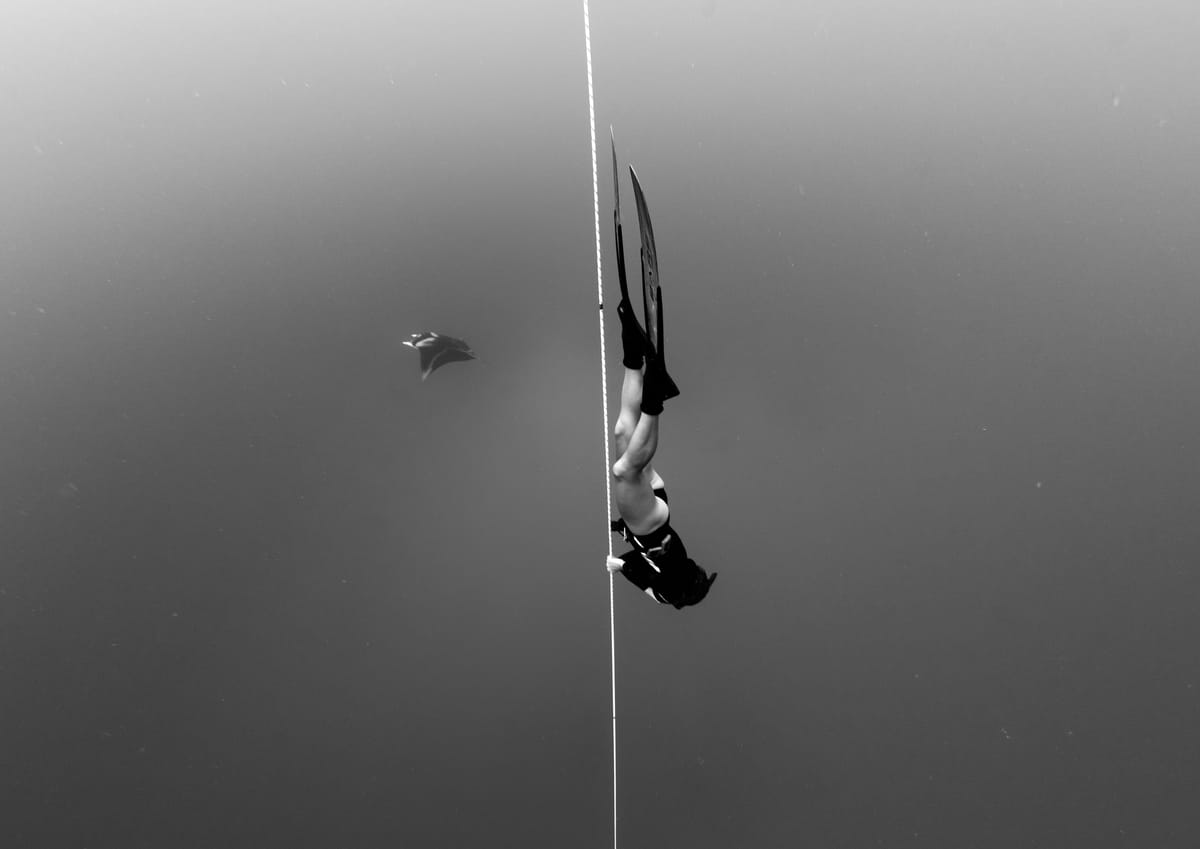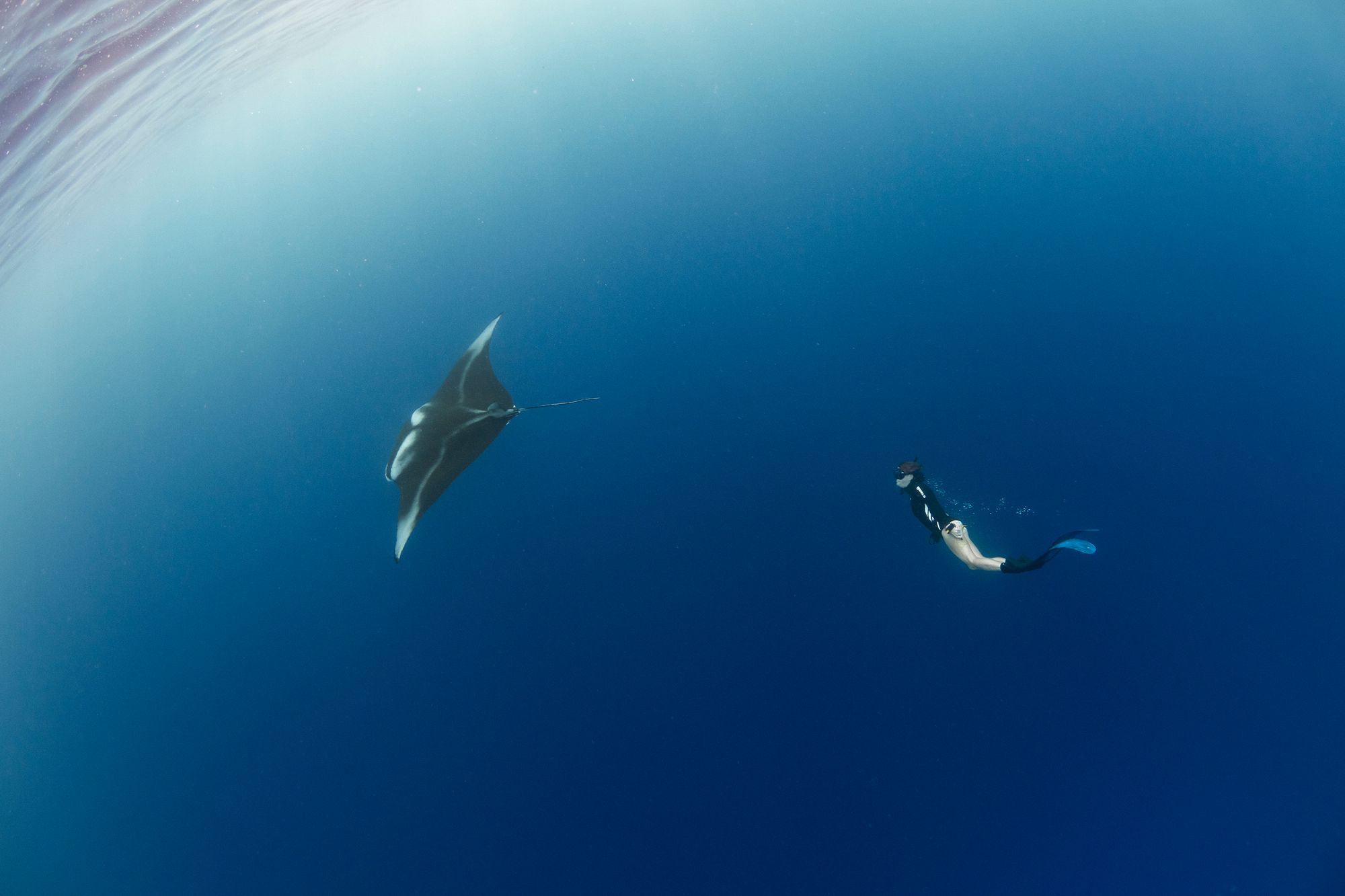Freediving

Freediving is different than SCUBA diving because you don't use tanks of compressed air. You dive only on your own breath. After years of SCUBA diving for coral research, I became slightly annoyed with the amount of gear you need for SCUBA diving and its price tag. Sure, SCUBA diving can be incredible and I highly recommend it for most people. I wish everyone could see the underwater world. But if someone is itching for a more psychically and psychologically challenging way to move in the water, freediving is the best.
On its surface, it's basically advanced snorkeling. You can duck-dive down into the water column to get a closer look at a coral reef or a fish or to just play in the water. Weather you're snorkeling at the surface of the water and diving down 5-feet or diving deep, equalization of your ears is paramount. Some people might get away with not equalizing in shallow depths, but that's dangerous for your ears. I equalize at the surface and as many times as I can, constantly, for the entirety of all my dives, whether on a freediving line or just snorkeling.
Going deeper, you probably will want a wetsuit to stay warm and you might need weights to offset your wetsuit's positive buoyancy. There are so many subtle elements to hone as you go deeper, which is why instruction from a certified freediving instructor is critical.
I once hired a freediving instructor in Phuket when I was living in Thailand in 2013. I couldn't afford the certification course, so the guy said he's just take me out for some dives. I learned a little bit about triangular breathing (longer exhales to lower your heart rate) and performed a good static apnea (5:05 minute breath hold). So, he took me out to dive with some of his buddies. I had no classroom training nor any clue what freediving does to the body. I dove to 100-feet. I felt the pressure. But I didn't dive for years after that because I moved back to Colorado and ultrarunning took over my life.
Fast forward to December 2019, I missed the ocean and wanted to earn my certification, so I signed up for a course in Boulder at Ocean First with Drew Herrick. When I started to learn how dangerous and stupid it is to dive to 100-feet without proper instruction, I realized that I had been lucky back in Phuket that I didn't blow an ear drum or damage lung tissue. Typically, you build up to diving at depths, just like training for an ultra. You don't want to run a 100-miler off the couch, and similarly you never want to dive deep without building up to it over time so that your muscles and body build tolerance to pressure.
Taking the course was incredible and exhilarating. Learning that you can dive safely and experience the marine world all on your own breath was empowering. For that first course, I got level 1 certified in New Mexico's Blue Hole (a 77-ft deep aquifer east of Albuquerque). I then got my level 2 certification over an extended stay on the big island of Hawai'i. Here I am practicing freefall, which is when negative buoyancy takes over and you quite literally fall freely down the water column like you're flying.
The key with freediving, as with most things, is practice. You can sit on your couch and hold your breath all day long, but the real joy and fulfillment for me is diving day after day, getting comfortable holding my breath at depths I can observe marine life. I have never gone past 100-feet and I don't really intend to. I aspire to take the Level 3 course, but am in no rush. Freediving for me is not about competing (although there is a rad competitive community), it's about exploring our oceans. It's about those chance encounters with a manta ray (hahalua in Hawaiian) or a school of fish. These are the moments I feel most alive.

Even though freediving might seem foreign and scary, it has a lot of similarities to ultrarunning. It requires harnessing complete focus of your breath, heart rate and mental space. A distracted diver won't reach her potential.
This focus helps me hone in on the things I can and cannot control elsewhere in my life. It helped me with election anxiety. It's helped me figure out what I want to do with my life, like moving away from outdoor industry work and going back to school for marine biology. Most of all, freediving is fun. It's fun to feel like a beginner, to learn about the phenomenal marine world, and to feel fully present. If you're interested, I recommend searching your local area for dive shops and asking if they host a freediving course. If you can swing it, get certified in a tropical location! Most of the world's best instructors teach in tropical locations.